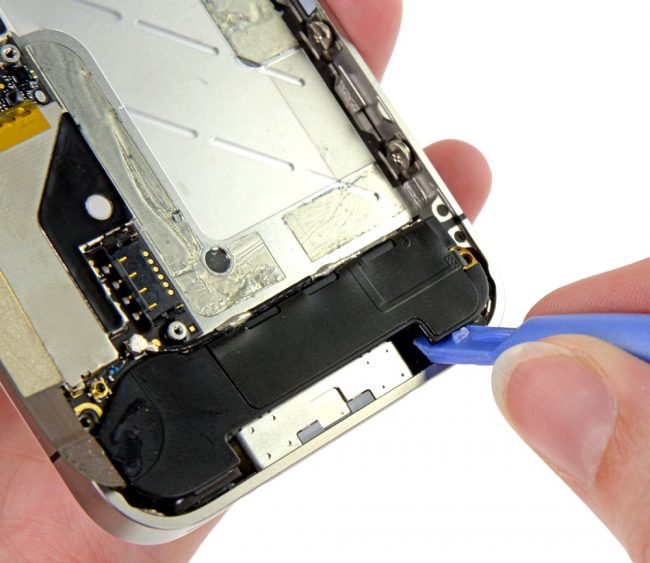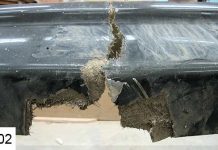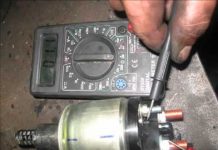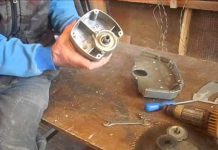Details: iPhone 3gs DIY repair from a real master for the site my.housecope.com.
Almost all of Apple's new phones are bestsellers. They are very popular and have won the hearts of most consumers forever. These gadgets are very reliable, functional and convenient. Contrary to their qualities, all iPhones, like all other smartphones, can break. More often the consumer is to blame. In a large number of cases, you can repair the iPhone with your own hands, but it is better to contact the service center specialists. Apple-Restore , they can use the new service for calling an Apple technician to your home, work or other convenient place for you for free.
There are not so many main reasons for iPhone breakdowns. These are breakdowns related to software (programs close by themselves, the phone “thinks” for a long time), which occurs if there was an intervention in the base platform or an incorrect installation of an application was made. The next type of breakdowns are breakdowns associated with the fact that the phone was dropped on the floor, something was dropped on it, and finally sat on it. Repair after such operations with the phone is not done quickly, and it is not cheap. A more serious breakdown may be a short circuit resulting from the ingress of liquid on the iPhone board. Repairs can be very expensive, or it can happen that the phone cannot be repaired.
The most common breakdown is the failure of the display or touch panel as a result of the phone dropping to the floor or asphalt. This breakdown can be corrected by yourself and not contact the service center, paying large repair bills.
| Video (click to play). |
So, first you need to unscrew the two bolts, which are located at the edges of the cable connector. Then you should carefully remove the top panel together with the display. This can be done with a regular suction cup or pry off the edge.
There are still small bolts from the end of the removed panel, which should also be unscrewed on both sides. There is another bolt next to the train, which must not be forgotten to unscrew. Thus, the display cable and touchscreen were disconnected. Now the display with the metal frame needs to be removed. This can be done with a knife.
We take a new display and, if the touchscreen is in order, we assemble the phone. But if you need to replace the touchscreen, then the removed display must be put aside. In order to separate the touchscreen from the metal frame, you need to take a hair dryer and warm it up around the entire perimeter. After this procedure, the touchscreen must be detached from the frame with a scalpel.
Next, you need to take double-sided thin tape and glue it around the perimeter to the panel body. The new touchscreen must be glued to the tape and the phone must be assembled.
Of course, all these manipulations are not difficult, but there is one "BUT". During such repairs at home, there is a high probability that other parts of the gadget will be touched and damaged, the repair of which will result in a tidy sum.
Manufacturing defects and defects in such phones are practically absent and all breakdowns are formed only through the fault of the users.
Manufacturers are very responsible for the manufacture of this device, however, not every owner is anxious and careful about the operation of this complex device. Often, carelessness leads to damage and you have to fix these defects.
But these actions can be carried out independently by reading our recommendations.
In this article, we will try to explain how it is possible to repair this device with our own hands using one example. You can also independently disassemble the gadget, replace components (covers, screens, batteries, etc.), replace vibration components.
The company produces several modifications of the iPhone (iphone 2g, 3g, 3gs, 4, 4s, 5, 5C, 5S, 6, 6+, 6S, 6S +, SE, 7, 7+), which are of very high quality, but breakdowns still happen and it is possible to do them yourself.
Using our instructions, you will have an excellent opportunity to fix the problem.
Before disassembling your device, decide why you need it at all, because it belongs to a very complex technological device and during disassembly it is easy to harm important components if you do not have enough experience. If you nevertheless decided to carry out repair and restoration work, perform these actions only if you are absolutely confident in your abilities.
You should be aware that all activities you perform at risk of your iPhone, which may lead to further malfunctions.
So, let's look at step by step how you can replace the microphone in the "iphone 4". To do this, you will need the following parts and tools (synchronization cable, special screwdrivers, a spatula for disassembly).
That's all the step-by-step instructions that we would like to offer you. We hope that with the patience, the courage and the allocation of time for this, you will succeed perfectly. We are not telling you how to put your phone back together, just follow the instructions in reverse order.
If you could not carry out a replacement, you always have the opportunity to call a professional service department, for example, a service center for the repair of mobile devices "MakeApple", which specializes specifically in the repair and restoration work and maintenance of iPhones.
The most common problem of breakage of iPhones, as well as other mobile phones, is gadgets flooded with various liquids when moisture gets inside. In such a situation, it is generally not worthwhile to carry out repairs on your own, or expect a miracle that everything will dry up on its own and the iphone will work on its own.
The easiest breakdown is from flooding with any liquid, this will close the controller (after drying, the device can work, but the battery is quickly discharged). You cannot do anything on your own, here you need to carry out diagnostics and professional complex work on cleaning and repair.
In a situation, if you are faced with a problem, when you doubt that you will fix the problem, it is best to contact the knowledgeable specialists of the service center. "MakeApple" (link above), where you can always turn for professional support and free advice.
iPhone 3 in versions 3G and 3GS went on sale in 2009, respectively, won its share of the mobile device market. Today, when Apple sells the iPhone 7, the iPhone 3 has lost its relevance due to outdated technology, and it is worn out.
But many users still successfully use these models in their work, extolling their quality and skeptical about new products. Often, such users have to deal with the replacement of the case, battery, screen, sensors or connectors. Because of this, it becomes necessary to disassemble the smartphone and replace its parts.
Some users may, for example, change the case or screen themselves, or replace the battery. So we decided, based on user questions, to write about the correct process for disassembling the iPhone 3GS version in order to enable other users to independently disassemble and replace some of the iPhone 3G parts.
In fact, the quality of this model version of the smartphone really paid off. Replacing the worn case or screen with a new one, you can use the device for a long time.As already mentioned, the first is the wear of the case and the screen, the second is the battery and buttons, in particular, the home Home and Power on.
Many people ask the question: what do you need to have on hand to disassemble a smartphone? Dismantling the iPhone 3G begins with removing the cover, so you will need a thin plastic spatula and a suction cup with a ring, a set of mini-screwdrivers for the iPhone, mini-containers for bolts from different parts of the iPhone, so as not to confuse them with each other, a rubber mat, liquid for wiping boards, a clip for taking out an iPhone SIM card, a hair dryer. Well, of course, have new parts ready if you change them.
How to disassemble and open the iPhone 3G is described in this article in more than detail. Disassembling an iPhone with a 3GS is almost the same as its predecessor, so the descriptive process is similar for both.
Before proceeding with the disassembly of the smartphone, you need to unlock the iPhone, and use the USB cable to dump all the information on it to the computer, saving a backup copy in iTunes. After that, you need to disconnect the device and turn it off completely by simultaneously holding down the Power button and the Home control button until the Apple icon appears.
Then we take out the SIM card from the slot, which is located on the outer side panel of the case. To do this, insert a paper clip with the sharp end into the hole at an angle until it clicks, which signals the opening of the card slot. We take out the SIM card and the slot.
In principle, this is not difficult to do, but some accuracy of actions is necessary. First, in the lower end of the case, unscrew two bolts with a special screwdriver. Then we carefully attach the suction cup to the bottom of the screen. After that, we pry it with a plastic spatula into the gap between the screen and the case and help to disconnect the screen with the help of a fixed suction cup.
But under no circumstances pull up the disassembled screen completely, since the iPhone display is held by three cables, which must be disconnected one by one. A sudden movement to open the screen can damage the cables or break the iPhone.
Lift the screen to gently get to the cables and use a plastic spatula to disconnect the motherboard cable, followed by the touchscreen cable, and then slowly detach the speaker cable.
When the cables are detached, you have two parts of the iPhone. Next, let's remove the screen, for which we unscrew the main bolts - two on each side at the end of the part of the iPhone with the display. If the bolts are covered with a strip of duct tape, remove it.
To disassemble the screen, turn part of the iPhone face down, and at the top find another bolt holding the metal plate to unscrew it. Then slowly pry the liquid crystal display with a plastic spatula or plastic card and disconnect it.
Attention! If the display is not easily removable, do not rush, gently and progressively warm the display glass at the end with a hair dryer so that the glue melts a little, and then pry the screen around the entire perimeter. At this stage, you can replace the display and screen with new ones, if necessary.
If you need to replace the battery or replace the case, then we continue to disassemble another part of the iPhone 3GS. Why do we detach the modular cable from the motherboard of the device below. And from above, we disconnect the audio jack cable with a spatula. The next step is to disconnect the connector and the additional cable. We unfasten the sticker that covers the 8 bolts, and unscrew all of them in turn, remembering which one goes after which, since they are different in length.
It remains to carefully not completely detach the camera module in order to get the system unit with a plastic spatula. Finally, you can get out the battery by prying it with the same spatula.
If the disassembly process has not yet been completed, since you wanted to change the worn out back cover, you must first unscrew the bolts holding the on / off button and the audio jack button in the disassembled part. Next, we disassemble the SIM card holder, and at the bottom, finally, unfasten the back cover of the case.
Finally, we take out the Power button and the mode switch, remove the modules in turn, which are responsible for the battery charge, as well as synchronization. Carefully remove the vibration motor.
Thus, all parts are removed and, if necessary, you can replace them with new ones. But the most important thing is the assembly of the device. Do not forget to follow the steps in reverse order, securing the loops, tightening the correct bolts in the correct order. No unnecessary details should remain.
Currently, a fairly large number of our compatriots give their preference to iPhones. However, these devices, despite their high quality, may fail. What to consider when repairing them?
One of the most common problems that iPhone repairs can cause is moisture getting inside the device. Water can seep in through the microphone, charging and headphone jacks, cabinet gaps. Ideally, any iPhone owner himself should constantly monitor the integrity of this device. However, when it is necessary to repair the iphone, the damaged parts of the case must be replaced in a certified service.
In the event that moisture has penetrated inside the iPhone, and the road is far away to the service center, then the device must be turned off immediately and try to dry all its electronic "stuffing". This can be done using a regular hair dryer. You need to remove the memory card tray from the phone and gently blow warm (in no case hot) air into the device. When repairing the iphone 4s of this kind, it is necessary to shake it periodically, so the drops of water that have got inside will flow out into the blown areas from hard-to-reach parts. Also, the device can be placed in rice cereal, which is able to pick up excess moisture. After these manipulations, you can carry the iPhone to the workshop, where professionals will revive it.
A damaged screen, which can be the result of a fall, can also be a fairly common problem. Since the glass of the iPhone is a single whole with the touchscreen, damage to the glass (outer shell) entails a violation of the integrity of the touchscreen. In this case, it is impossible to repair the iphone 3gs yourself, you need to contact the service center. But sometimes, if the damage is not so serious as to cause the iPhone to malfunction or there is no way to urgently use the services, then it is worth applying a protective film to the phone screen. If the latter is not there, then you can also use a strip of tape. This kind of measure is not a solution when repairing iPhones, this step will protect the owner of the iPhone from the probable occurrence of problem number 1, namely, moisture getting inside the device. Further, at the first opportunity, you should carry the phone to the service.
An equally serious problem for any iPhone owner is damage to the case, as a result of which the iPhone 4 or any other model may need to be repaired. Such problems can occur if the iPhone is dropped or in contact with sharp or hard objects (such as in a pocket or bag). On the Internet today you can find many videos that show how to replace the case yourself. However, unprofessional repairs can damage the iPhone's microcircuits. Therefore, it is better in this case to immediately take the phone to the workshop, and not to repair it yourself. Otherwise, you will have to pay a larger amount for repairs in order to eliminate all the problems that have arisen due to your wrong actions.
Pull on carbon on iPhone Our specialists tried it for the first time 4 years ago, when the durable aluminum case of the first model was replaced by the iPhone 3G, clothed in fragile plastic, bursting after a moderate impact and scratching even by the most pedantic owners.
IPhone case replacement was one of the most demanded services back then. But Apple did not ship to the foreign market original cases for iPhone 3G and the Chinese quickly set up production of even more fragile and flimsy clones.That's when we got the idea to make an iPhone case out of a durable but lightweight material. The most suitable for this purpose was carbon.
Carbon fiber woven from carbohydrate strands and impregnated with polymer resins (most often epoxy) was impossible to tear. It was not afraid of sprawling cracks, like the original case, and even withstood a drop on an acute angle from a great height. The strength of this material has been repeatedly confirmed by numerous tests in the automotive world; it has long been successfully used in aviation and even in rocket and space technology.
Immediately, we note that disassembling an iPhone on your own is a risky business. Even replacing the back panel in order to install a luminous logo on i P hone 5 may result in a breakdown and the need for expensive repairs at a service center. However, if you are still confident in your abilities, the instructions below should help you.
We unscrew the screws from the outside. We do this using a special Pentalobe screwdriver.
Raise the screen. This requires a special suction cup.
Now we disconnect the cables from the screen by unscrewing the small screws that attach them. We will also detach the antenna and the display itself. To make it easier to pry on the trains, use a special plastic spatula.
Next, unscrew the cable locks on the motherboard.
The battery can now be removed. Pay attention to the fact that it sticks to the glue, so you will have to use a spatula to detach it.
After that, you can unscrew the camera, which is held on the body with two screws.
Next, we disconnect the remaining connectors (microphone, antenna), as well as the rear panel cable leading to the motherboard. Then remove the SIM card slot.
At this point, it is better to complete the disassembly. Generally carry out repairs and tuning i P ad and i P hone is better in a specialized workshop.

First of all, turn off the device and unscrew the two bolts located on the bottom panel; then attach the suction cup to the screen (it should "sit" just above the HOME button).
Hold the phone with one hand and gently pull the suction cup with the other until the screen is slightly away from the case. Next, use a spudger to "snap off" the plastic fasteners holding the front panel. Don't try to detach it completely - just raise it 90 degrees to start.
Make sure iPhone is turned off and remove the two screws located on the bottom of the device. Attach a suction cup to the screen (just above the HOME button). Pull slightly on it and begin to separate the front panel from the case using a plastic tool (it is convenient to use it to “snap off” small fasteners). As a result, the front panel should "move away" and be held only with the help of a ribbon cable bolted to the motherboard. Unscrew them and use a plastic tool to remove the ribbon cable from the connector. The front panel can now be removed permanently.
iPhone 4 S ... Replacing the external volume button
iPhone 3gs - this old man was released back in 2009 and still continues to delight its users. But his visual state may already be far from ideal. Over time, the back plastic cover could get frayed, worse, cracks could appear. This is one of the main problems of the iPhone 3gs.
The screen could become completely unreadable due to the abundance of scratches. The Home keys, Power keys and volume rocker could also stop working. In order to give your device a new look or change faulty components, you can disassemble the smartphone. Do it yourself or carry it to a service center, it's up to you.
As for me, it is better to disassemble and change everything yourself than to pay someone else for it. Moreover, it is not difficult to disassemble an iPhone. This article will teach you how to disassemble iPhone 3g / 3gs with ease.First of all, you need to get a special set of tools for parsing the iPhone 3g / 3gs.
Professional toolbox
In particular, we need a suction cup, without which it will be extremely difficult to disassemble the phone. Plastic spatulas are also very useful, which help to snap off the trains without third-party damage, well, screwdrivers with specific slots will also serve us, in general, the set is not very expensive, but it will always come in handy on the farm.
Well, let's proceed directly to disassembly and turn off the gadget. We start by unscrewing the 2 screws on the bottom of the iPhone.
Then, using a suction cup, gently pry on the screen unit. Disconnecting it completely will not give you a ribbon cable from the motherboard. Separate it with a plastic spatula. After that, we disconnect the touchscreen cable and the speaker cable.
Now you can completely detach the screen unit. If the problem was in the touch glass or display, then you need to disassemble this unit. Unscrew the screws from the base of the block ...

In order to free the glass from the remaining structure, it is necessary to heat the iPhone glass from the end with a hairdryer, as it is adhered to by glue. Next, we pry the glass with a plastic spatula and detach it around the entire perimeter.
The protective glass and display can now be replaced. If the problem was in the battery or other housing part, we continue to disassemble. We take out the tray for the sim card. Disconnect the module cable at the bottom of the smartphone from the motherboard. Disconnect the Audio connector cable at the top.
After that, disconnect the connector marked with the number six. For iPhone 3gs, turn off one more cable, it is marked with the number seven (it is not in 3g). Next, detach the sticker. Next, unscrew eight screws. The main thing is to remember in what order they go! Since they are all of different lengths.
We disconnect the camera module, but not completely, since the cable, which is attached to the body, has a non-removable mount. Now we pry the motherboard with a plastic spatula and take it out.
Access to the battery is open. We take it out with a plastic spatula. If you need to change the back cover of the iPhone 3gs, then continue dismantling. Unscrew the screws securing the power button and audio jack.
We dismantle the SIM card ejector. Detach the plastic cover on the bottom.
We dismantle the Power button and the mode switch. And finally, we dismantle the charging module, the synchronization module and the vibration motor.
That's it, the iPhone 3g / 3gs is completely disassembled. Now you can replace any faulty part.
iPhone 3G disassembled
Do not forget to read the comments, there is also a lot of useful information. If there is no answer to your question, but there is an answer to later comments, then the answer to your question is contained in the article, respect someone else's time.
Thanks, I disassembled everything and replaced the ikran, thanks a lot.
Thanks for the advice, I changed the battery, everything works. Joy.
Good afternoon, we are glad to be of service to you. Good luck!
And if he writes that he needs to unlock the iPhone.
All the necessary spare parts for the repair of Apple iPhone 3GS, as well as tools for disassembling phones, you can purchase in our store.
Take out the SIM card holder first. To do this, insert a paper clip into the small hole at the top of the phone and press down - the holder will slide out.
The holder can now be removed. Remove the two screws from the bottom of the phone.
Now attach the touchscreen suction cup to the bottom of the screen. Be careful not to overdo it. Hold the phone with one hand and slowly lift the suction cup with the other hand. The shield will rise, but is still connected by three stubs from the opposite end of the shield.
You can see the numbers of the connectors of the loops. Each is secured with a clip. Just snap off 1 and 2 to disconnect the cables.
The next ribbon has a latch that you need to pull to disconnect the ribbon.
Remove the screws on each side of the shield.
The screws on one side will be covered with adhesive tape, which needs to be peeled off. Now remove the screw circled below.
Apply the hair dryer over the area of the phone, then gently slide the plastic card around the perimeter to release the screen.
You have separated the display from the touchscreen.
Now you need to separate the touchscreen from the frame. First use a hair dryer to soften the glue, then swipe the plastic card to remove the frame from the touchscreen.
Carefully separate the old screen from the frame, making sure there are no pieces of glass on the frame in order to properly glue the new screen.
Do not forget that you can buy all the necessary spare parts for the iPhone 3GS in our store.
We disassemble the Apple iPhone 3G phone to replace the display or case.
This article is not a guide to action! You are solely responsible for collecting and disassembling your device.
Many manufacturers do not assume warranty obligations if the device has been disassembled by the user. If you do not want to void the warranty for your device, check the warranty terms in the documentation or with the device manufacturer.
While holding your phone upright, insert something like a paper clip through the hole at the top of the phone. This will release the SIM card holder.
The phone with the SIM card holder removed should look like this:
Remove the two screws from the other end of the phone.
Now attach the suction cup at the bottom of the screen. Be careful not to press down too hard. Then, with one hand on the back of the phone, slowly pull the suction cup toward you with the other hand. In this case, the screen will detach, but on the other hand it is still supported by three cables.
By lifting the screen, you can reach the trains. Two of them, circled in the picture, just need to be pulled up and out of the connectors.
The third train, circled in the picture below, is held down by a black clip. Lift the latch and pull the ribbon cable out of the connector. You can now remove the LCD of your phone.
Remove the screws from each side of the screen.
The screws on the other side are sealed with a strip of tape that needs to be peeled off.
Now remove the screw circled in the picture:
To remove the display, pry it open with a case disassembly tool or credit card:
So you removed the LCD of your phone:
Reassemble in reverse order.
If you liked it, please do not be lazy to click "I like" or "share" or "+1" just below, or post a link to the article in your blog or forum. Thank you 🙂
| Video (click to play). |
You can rate this article:





































